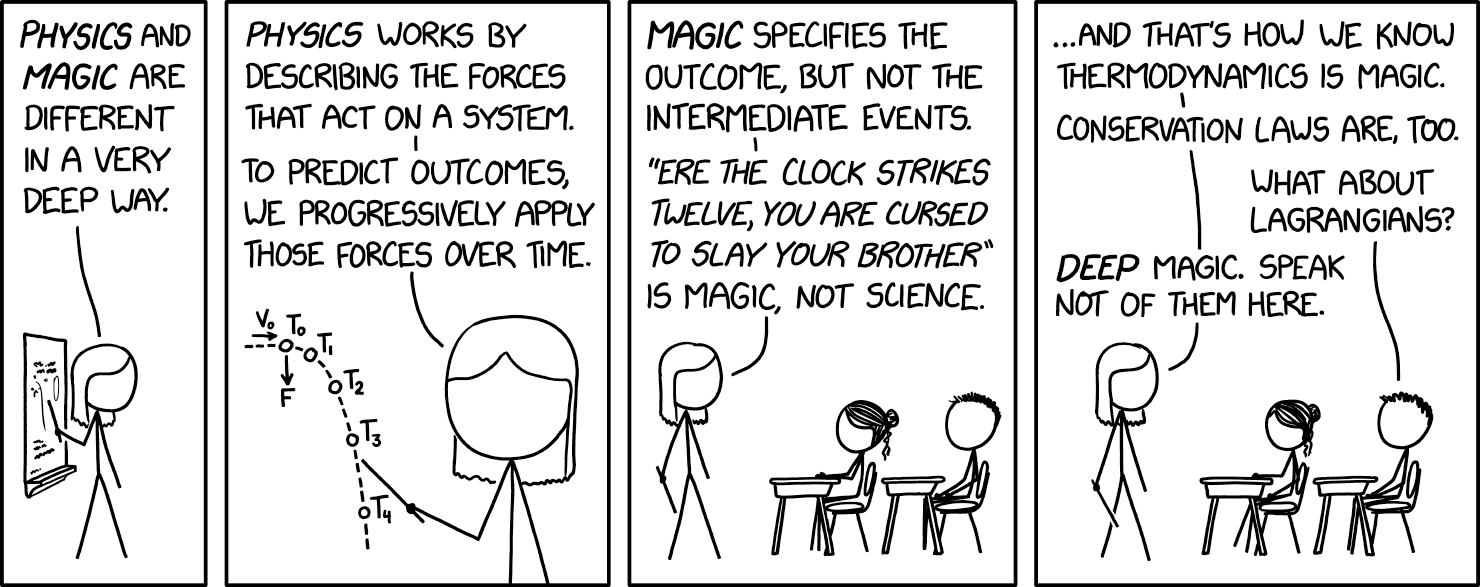this post was submitted on 09 Mar 2024
563 points (98.8% liked)
xkcd
10926 readers
3 users here now
A community for a webcomic of romance, sarcasm, math, and language.
founded 2 years ago
MODERATORS
you are viewing a single comment's thread
view the rest of the comments
view the rest of the comments

This was one of my biggest issues with math myself. Sin, cos, tan, and logarithms still confuse me. Meanwhile, derivatives (a calculus concept) are pretty straightforward conceptually with the physics examples of distance, speed, and acceleration.
Derivatives are the change in something. So if you have a graph of something's distance over time, the derivative is a graph of the change in distance at any given moment, or the speed of the object. Likewise, the derivative of the object's speed is a graph of the object's acceleration, or the change in the object's speed at any given moment.
Anyway, this is also something that I used to rant about with my programming courses in college. You need an understanding of both the concept and the execution of it in order to program with a consistent amount of success, but most courses (and learning material) focus on one or the other.
I do systems admin/engineering, and I'm the team code monkey, but my co-workers want to learn. It's still the core hurdle I see my them make when they try to script. They either have the concept down with no clue how to script it, or they're flailing script snippets around without actually understanding what those parts actually do.
Logarithms confuse me too, even though I "invented" logarithms one day when I was bored before ever being taught about them. I know they're exponents in reverse, and I know they can be useful to diminish the relative weight of larger numbers, but whenever I see logs in an equation, my degree of "I can figure out what this equation does" takes a significant hit.
Whenever dealing with exponential stuff i try to just focus on the formula of what is happening in the exponent. logarithms are taking that down to "normal space". E.g. exponential functions are like in a warp drive, but you still have ships that can warp faster than others.
I wished they had taught us more context and concept in college EE classes. I guess super smart people figure that out on their own. It took me until several years after college before things started to click a little. I'm still working on it.
Electromagnetics still seems like dark magic to me though. I hated that class because it seems like it should have been the coolest topic ever but nothing made any sense.
Maybe they need to get dumber people teaching this stuff because at some point if you are too smart you take for granted leaps that elude some of us.
I have done teaching in a Corp setting for several years, and I find that all the questions from and confusion of students really push me to explain better, understand deeper, question some of the concepts, etc. (We teach both concept and execution)
I guess either our classes needed to ask more questions or the profs needed to work on their teaching or something.
Electromagnetics are dark magic and there is no way to teach it in any simpler terms that make it plausible without dark magic.
Even if you get all the concepts down. If you start asking "why". The only real answer is, because in 73 BC an egyptian, a roman and a greek magician met in a basement in Kathargo to perform the most heinous ritual. But since the roman guy had a lisp in saying his incantation, instead of unleashing the demons of hell onto earth, electromagnetics becamse what they are.
Imagine taking a line and rolling it around a circle so that it's always touching. Like a wheel on a flat surface, but from the wheel's perspective.
Sine and cosine are the X and Y coordinates of the intersection point, and tangent is the slope of the line.
You can also relate it back to acoustics!
Woah